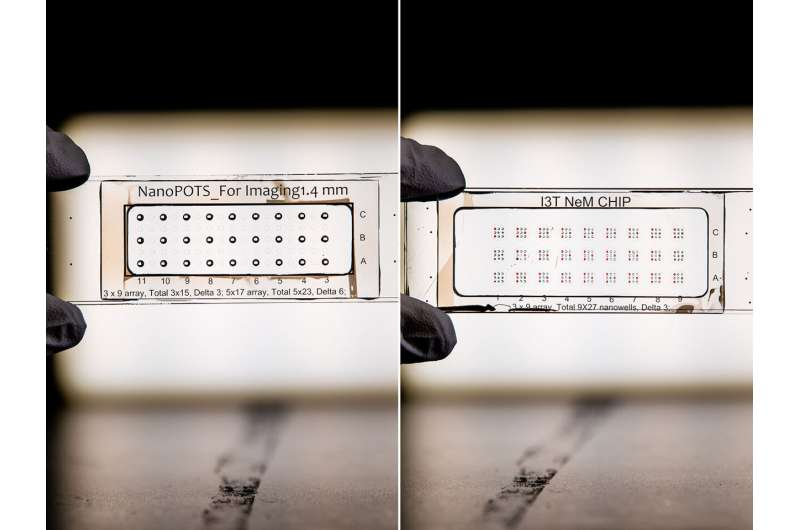Nested nanowells speed single cell studies

Researchers tracking the behavior of cancerous tumor cells have a new tool in their arsenal that can process 10 times the number of cells in one day. A new nested nanoPOTS chip, developed at Pacific Northwest National Laboratory (PNNL), was reported October 29 in the journal Nature Communications.
Analytical chemist Ying Zhu and his colleagues first described the nanoPOTS technology in 2018. NanoPOTS stands for Nanodroplet Processing in One pot for Trace Samples, and it is a method for analyzing hundreds of proteins in individual cells at the same time.
“Individual cells work in concert. The ability to analyze proteins in each cell is key to getting detailed information on the biological role of each cell,” Zhu said. “From there, we can start to map how cells work together in tissue and organs.” Zhu has worked on a team with colleagues at the Environmental Molecular Sciences Laboratory, or EMSL, a Department of Energy Office of Science user facility located at PNNL, to use nanoPOTS to study proteins in cells of mouse uterine tissue.
Nine nanowells per nest
The challenge for the single-cell proteomics method is handling the tiny amounts of protein content within a single cell. Every protein matters during sample preparation and analysis.
Each sample is then analyzed using a precise molecular identification technique called mass spectrometry. This approach uses extremely tiny samples: more than 250 single-cell samples from a nanoPOTS chip can fit in a drop of water.
The original nanoPOTS technology confined samples in individual nanowells organized in a grid on the chip. This approach reduced sample loss by more than 99 percent compared to other technologies at the time.
As described in Nature Communications, the design of the new nanoPOTS chip, called N2, greatly increases the number of wells per chip to 243 nanowells on one chip. Groups of nine nanowells are nested in each of 27 clusters across the chip.
With the N2 chip, Zhu and his colleagues analyzed about 100 individual mouse cells derived from the lung, immune system, and axillary lymph node vessel. They quantified about 1,500 proteins in each single cell and used this information to classify cells based on protein abundance.
“We are also working to make this technology easy for other laboratories to use,” Zhu said. The N2 chip can be manufactured in a standard clean room, and we used a commercial single-cell isolation system for liquid handling rather than a custom-built system as before.”
PNNL recently licensed the nanoPOTS technologies to the biotechnology companies SCIENION and Cellenion. Cellenion makes the single-cell isolation system that Zhu and his colleagues used with the N2 chip.
“The goal of this partnership is to combine commercial precision liquid handling systems with the nanoPOTS platform to develop an effective system for sample preparation for single-cell mass-spectrometry-based proteomics,” said PNNL commercialization manager Jennifer Lee.
New technology consistently identifies proteins from a dozen cells
Jongmin Woo et al, High-throughput and high-efficiency sample preparation for single-cell proteomics using a nested nanowell chip, Nature Communications (2021). DOI: 10.1038/s41467-021-26514-2
Citation:
Nested nanowells speed single cell studies (2021, November 18)
retrieved 18 November 2021
from https://phys.org/news/2021-11-nanowells-cell.html
This document is subject to copyright. Apart from any fair dealing for the purpose of private study or research, no
part may be reproduced without the written permission. The content is provided for information purposes only.
For all the latest Science News Click Here
For the latest news and updates, follow us on Google News.

